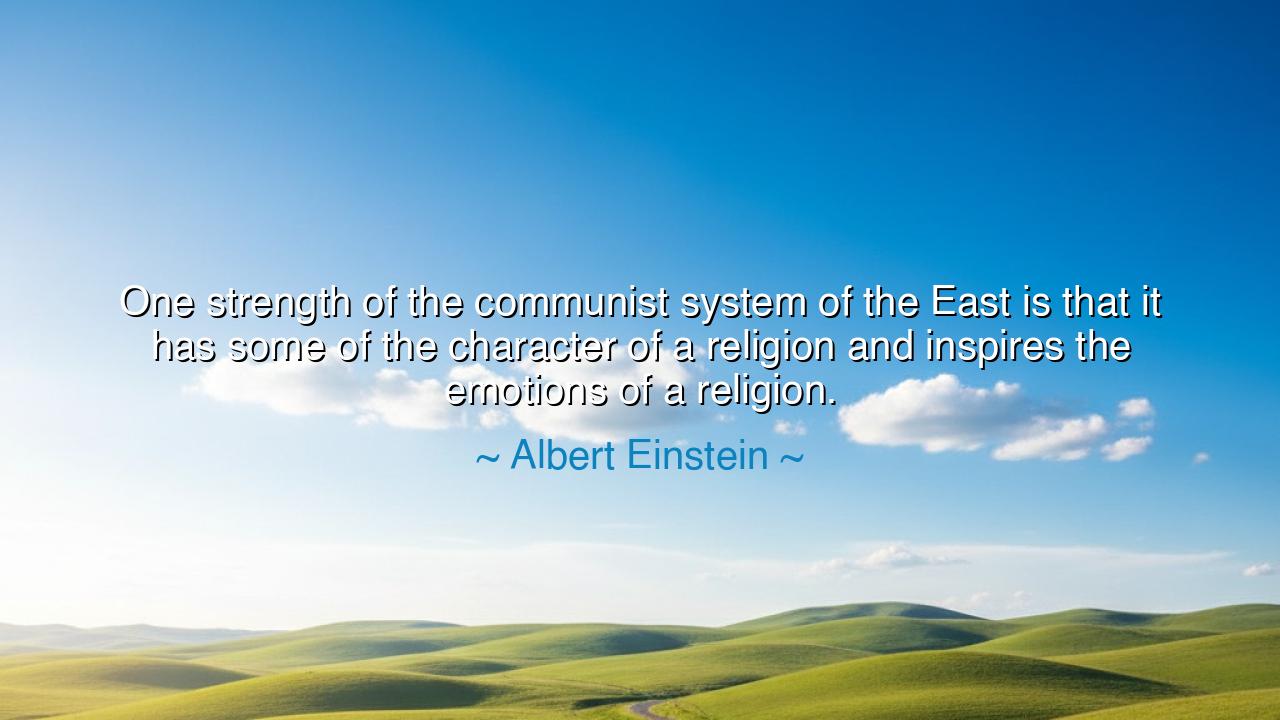
One strength of the communist system of the East is that it has
One strength of the communist system of the East is that it has some of the character of a religion and inspires the emotions of a religion.






Albert Einstein once said, "One strength of the communist system of the East is that it has some of the character of a religion and inspires the emotions of a religion." In these words, Einstein draws our attention to a powerful and unsettling truth: that ideologies, much like religions, can transcend the realm of politics and governance, shaping the hearts and minds of people on a deeper, almost spiritual level. Communism, with its promises of equality, justice, and a world free from oppression, evoked a sense of purpose and devotion among its followers. Like a religion, it offered a vision of a utopian future, a world in which the individual was bound not only to the state but to a higher, collective cause.
In the ancient world, religions were not mere collections of rituals and beliefs—they were forces of transformation. They bound individuals together with a common purpose, often transcending the boundaries of family, tribe, or nation. Communism, particularly in its Eastern form, shared this power: it promised a new world, a paradise on earth where the individual would be liberated from the chains of inequality and exploitation. Much like the ancient gods who inspired devotion and sacrifice, the Soviet Union and its allies created a collective faith in the system itself, a belief that the struggle for the future was sacred, worthy of ultimate sacrifice and devotion. The emotions that the communist movement stirred were not dissimilar to those religions inspire: fervor, commitment, and the hope for a world transformed.
Consider the fervor with which the early Bolsheviks pursued their revolutionary goals. Men and women who had lived in abject poverty and oppression were given a cause to rally behind—a new belief system that promised salvation from their suffering. The Russian Revolution, much like the great religious revolutions of history, was not just a political upheaval, but a spiritual one. The founding principles of Marxism, while rooted in materialist philosophy, took on an almost divine quality in the minds of its followers. For those who truly believed, Marxism became more than just an economic theory; it became a sacred mission, a truth that governed all aspects of life, an all-encompassing faith that required unwavering commitment.
The great leader Vladimir Lenin himself was viewed by many as a prophet of this new world order. His words were treated with reverence, and his vision for the future was seen as divinely inspired. His disciples did not simply follow him as a political figure; they followed him as one might follow a messiah—with devotion and a promise of a future built upon his teachings. In this sense, the communist system mirrored the characteristics of the world’s greatest religions, which also required followers to submit themselves completely to the cause, to give their lives in service of the greater good. The emotions felt by those who joined the cause were not just political in nature; they were spiritual, fueled by a deep belief in the transformative power of the ideology.
The ancient Romans understood this dynamic well. Their empire, though grounded in laws and politics, also demanded a kind of religious devotion to the emperor and the state. The worship of the emperor was not simply an act of obedience but of faith. Similarly, the communist system of the East required not only compliance but devotion, an unwavering belief in the idea of communism as a sacred mission. It demanded of its followers a total commitment, much as religions demand devotion to their gods or their ideals. In this way, communism became not just a political system, but a faith, inspiring emotions of reverence, sacrifice, and hope.
The lesson in Einstein’s reflection is profound. It reminds us that belief—whether in religion or in ideology—has the power to shape not only our minds, but our hearts. The communist system, like many religions before it, became a framework for life that gave its adherents not just a set of political beliefs, but a sense of purpose and identity. It shows us how powerful ideologies can be when they inspire not just intellect, but emotion, and how devotion to an idea can become a force for both good and evil.
The practical action we can take from Einstein’s insight is to examine the ideologies we follow—whether they are political, religious, or philosophical—and ask ourselves if we are placing our faith in them blindly. Are we following an ideology out of genuine conviction, or are we surrendering our individuality and critical thinking to a system that demands our devotion? The challenge of the modern world is to stay vigilant, to cultivate the ability to question even the systems that seem most entrenched in our hearts, and to ensure that our beliefs—whether in politics, religion, or any other domain—serve the greater good, rather than blind us to the truth of our shared humanity.






AAdministratorAdministrator
Welcome, honored guests. Please leave a comment, we will respond soon